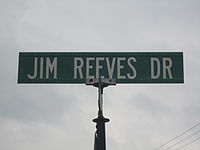Jim Reeves
Winning an athletic scholarship to the University of Texas, he enrolled to study speech and drama but quit after only six weeks to work in the shipyards in Houston.
[1] Reeves' initial efforts to pursue a baseball career were sporadic, possibly due to his uncertainty as to whether he would be drafted into the military as World War II enveloped the United States.
Reeves at this point was influenced by early country and western swing artists including Jimmie Rodgers and Moon Mullican, as well as popular singers Bing Crosby, Eddy Arnold and Frank Sinatra.
According to former Hayride master of ceremonies Frank Page, who had introduced Elvis Presley on the program in 1954,[3] singer Sleepy LaBeef was late for a performance, and Reeves was asked to substitute.
Jim Reeves was a country music singer who had success early on in his career, first with the song "Mexican Joe" in 1953 for Abbott Records.
In 1954, Abbott Records released a 45 single with "Bimbo" on side-A which hit number one and featured Little Joe Hunt of the Arkansas Walk of Fame.
Amid protests from RCA, but with the endorsement of his producer Chet Atkins, Reeves used this new style in a 1957 recording, a demonstration song of lost love that had originally been intended for a female voice.
In addition, Malone lauded Reeves' vocal styling—lowered to "its natural resonant level" to project the "caressing style that became famous"—as to why "many people refer to him as the singer with the velvet voice.
According to Billboard, "Reeves’ star shone equally bright overseas in the United Kingdom, India, Germany, and even South Africa.
[16] The film was released with a special prologue and epilogue in South African cinemas after Reeves' death, praising him as a true friend of the country.
In a June 6, 1963 interview with Spotlight magazine, Reeves expressed his concerns about the tour schedule and the condition of the pianos, but said he was pleased with the audiences.
The single "Welcome to My World" with the B/W side "Juanita" was released by RCA Victor during June 1963 and bought by the distributors Irish Records Factors Ltd.
A photograph in The Donegal Democrat had Reeves' singing in the Pavesi Ball Room on June 7, 1963, and an account of his nonappearance on stage in The Diamond, Kiltimagh, County Mayo in The Western People representing how the tour went in different areas.
[18] Reeves played at the sports arena Njårdhallen, Oslo, on April 15, 1964, with Bobby Bare, Chet Atkins, the Blue Boys, and the Anita Kerr Singers.
The singer's widow, Mary Reeves (1929–1999), probably unwittingly started the rumor that he was flying the airplane upside down and assumed he was increasing altitude to clear the storm.
[23] Reeves' friend, musician Marty Robbins, recalled hearing the wreck happen and alerting authorities to which direction he heard the impact.
Relying on his instincts more than his training, evidence suggests he applied full power and pulled back on the yoke before leveling his wings—a fatal, but not uncommon, mistake that induced a stall/spin from which he was too low to recover.
The crash site was in a wooded area north-northeast of Brentwood, roughly at the junction of Baxter Lane and Franklin Pike Circle, just east of Interstate 65, and southwest of Nashville International Airport where Reeves planned to land.
On the morning of August 2, 1964, after an intense search by several parties (which included several personal friends of Reeves, among them Ernest Tubb and Marty Robbins), the bodies of the singer and Dean Manuel were found in the wreckage of the aircraft, and at 1:00 pm local time, radio stations across the United States began to announce Reeves' death formally.
The coffin, draped in flowers from fans, was driven through the streets of Nashville and then to Reeves' final resting place near Carthage, Texas.
The inscription on the memorial reads, "If I, a lowly singer, dry one tear, or soothe one humble human heart in pain, then my homely verse to God is dear, and not one stanza has been sung in vain."
She combined unreleased tracks with previous releases (placing updated instrumentals alongside Reeves' original vocals) to produce a regular series of "new" albums after her husband's death.
Originally, "Distant Drums" had been recorded merely as a "demo" for its composer, Cindy Walker, believing it was for her personal use and had been deemed "unsuitable" for general release by Chet Atkins and RCA Victor.
and "I Fall to Pieces", which combined separate vocal tracks of both he and the late country star Patsy Cline, who had also passed away in an airplane crash mid-career.
Although the two had never recorded together, producers Chet Atkins and Owen Bradley lifted their isolated vocal performances off original three-track stereo master session tapes, resynchronized them, and combined them with digitally re-recorded backing tracks.
Since 2003, US-based VoiceMasters has issued more than 80 previously unreleased Reeves recordings, including new songs, as well as newly overdubbed material.
[26] Reeves' fans repeatedly urged RCA or Bear Family to re-release some of the songs overdubbed during the years after his death which have never appeared on CD.
The song "A Tribute to Jim Reeves" was written by Eddie Masterson, and recorded by Larry Cunningham and the Mighty Avons; during January 1965, it scored on the UK charts and top 10 in Ireland.
In the UK, "We'll Remember You" was written by Geoff Goddard, but not released until 2008 on the Now & Then: From Joe Meek to New Zealand double album by Houston Wells.
A play by author Dermot Devitt, Put Your Sweet Lips, was based on Reeves' appearance in Ireland at the Pavesi Ballroom in Donegal town on June 7, 1963, and reminiscences of people who attended.
